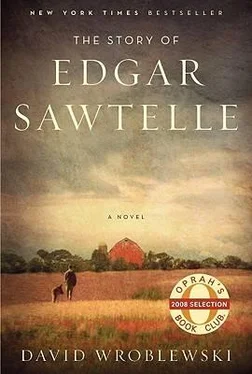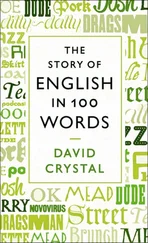He glanced around. The figure in the rain had turned to watch.
He attended once more to the barn, his examination now minute and frantic. He traced the rusted iron door hinge with his fingertips, and the jagged crevices between the boards, where the shadows were as sharp as the line dividing the moon. He knew if he waited long enough he would see crazy things-fantastic, inexplicable, dreamlike things-but everywhere he looked he found the ordinary stuff of the world. Painted wood. Pitted iron. Water falling earthward from his face, each droplet’s path so foreshortened it seemed motionless and shrinking until it struck the ground. He shut his eyes and listened to his breath blowing.
When he turned, rain fell evenly through the light. He was alone. He looked about, then spotted the figure standing near the corner of the milk house. Having once learned the trick, Edgar could not unsee him. The figure gestured. His legs blurred into skirts of rain and then he disappeared from view. The dogs began to bark.
Edgar found him standing in front of the pens. All the dogs were out, peering forward, unafraid, excited recognition in their voices. Their tails jerked back and forth, throwing sprays of water. The figure turned to him and his arms moved in sign. Trails of water fell through the air. The distance and the figure’s indistinct form made it difficult to read.
Edgar stepped forward. The figure repeated the sign.
Release a dog.
Edgar blinked in the rain.
Why?
You think I’m not real. Open a pen.
Edgar walked to Essay’s pen. He flipped up the latch and linked his fingers through the wire mesh and pulled the door open. Essay bounded out at once. She dropped her nose to the ground at the spot where the figure had stood and slid a paw along the grass. She looked at Edgar and then into the yard. Her tail swung happily behind her. The figure gestured a recall, but Essay was already closing the distance at a trot. When she arrived she circled several times, her shape contorting as she passed behind and finished on his left in a sit. The figure stepped forward, a water-shimmer, and turned and signaled a down. Essay dropped onto the wet grass at once. The figure bent down and passed his hand across the side of her face. A stream of water coursed along her already soaked cheek and she panted happily and pulled her lips back in a grin of pleasure and lapped at the figure’s hand. Her tongue passed through a stream of water. She closed her mouth reflexively and swallowed and began to pant again.
The figure looked back toward the barn and signaled a broad sit and in unison all seven dogs behind Edgar sat. Then he signaled a release. One by one they stood. They trotted back into the barn. A moment later the canvas flaps parted and seven muzzles appeared.
You see?
At last, the figure signaled Essay to kennel. She trotted to her pen and disappeared into the barn. Before Edgar had latched the door behind her, she had joined the other dogs looking out at them.
He turned back to the rain.
Edgar.
What-what are you doing here?
Don’t you recognize me?
I don’t want to say. I’m not sure. I might.
How many times have we stood here and looked back at the house together? How many times have we counted the deer in the field from here? How many times did I lift you into the branches of those trees to pick an apple? Look at me Edgar. What do you see?
I don’t know.
What do you see?
I know why you’re here. I’m so sorry. I tried so hard.
You think you might have saved me.
I couldn’t think of what to do. I tried everything.
I would have died anyway.
No. I couldn’t tell them. There could have been doctors.
They would have done nothing.
But I was there. I made it worse!
The rain-figure bowed his head. A space of perhaps three feet separated them. After a moment the figure looked up and stepped forward and began to raise his hands as if to embrace him.
Edgar couldn’t help himself. He stepped back. Instantly, a wave of remorse washed through him.
I’m sorry, he signed. I didn’t mean that.
You didn’t understand what you were seeing that day.
The figure turned and melted away toward the front of the barn, then rounded the corner of the old milk house. After a moment Edgar followed. He stood before the barn doors. Under the floodlight, his sign was easy to read.
Go inside. Now. Before the rain stops.
And do what?
Search.
For what?
What he lost. What he thinks is lost forever.
Then the figure stepped away from the door. Edgar tipped the old iron bar away and turned the latch handle. Inside, it was dark but dry and the cessation of rain shocked him. He looked out the door, but it was only rain falling again. None of the dogs barked, though a few stood watching from their pens.
He pushed the workshop door open and froze, unable to cross the threshold at first. He reached inside and flipped up the light switch and surveyed the room: workbench to the left, the pegboard covered with tools mounted on the wall above it. Vise twisted open halfway. Except for the filing cabinets, they had barely touched any of it that winter, and a velvet hoar of straw dust lay over the bench. Across from him, the mow stairs led upward, and in front of them, shelves filled with cans of paint and creosote, their labels stained with drips and runners.
He took a breath and stepped inside. He took the paint cans off the shelf and stacked them on the workbench. Though the rest of the workshop was covered in dust, the paint cans were not; only a thin powder covered them, as though they had been recently moved. When he finished, only a pile of old brushes and rollers remained, stacked haphazardly at one end of the shelf, and these he put on the workbench, too.
Beneath the shelves, on the floor, sat the two enormous cans of scrap his father had been trying to move that day, brimming with bent nails, stripped screws, spare machine parts, the iron rusted to a dark brown, the steel parts dull gray. He crouched and tried to tip the nearest one out from the wall. After the third or fourth heave, the welded metal handle snapped off and he tumbled backward. He returned to it on all fours, hugged it, and lunged. The bucket tottered and fell and he quickly rolled it along, leaving a trail of orange scrap. He knelt and swabbed the scrap about.
The second can had lost its handle long before. Another spray of scrap. In the process, something sharp had sliced the tip of his finger. Blood mixed with the rust on his hands and began to drip to the floor. He got down on his knees again, but it was hopeless and he sat back. Under the mow stairs, a jumble of dusty odds and ends lay tucked into the crevice where the stair stringers met the concrete floor-a paintbrush, long ago fallen from behind the shelf, a bunched-up rag, a tin of washers. He scuttled over. One by one he tossed them into the workshop. A maroon drop of blood caught in the cobweb below the last tread and shivered blackly in the air. He reached out and brushed the cobweb away.
There, against the wall, lay a plastic-barreled syringe. He picked it up and blew the dust away and held it to the light. The plunger had been pressed three quarters of the way down; the black double gasket touched the final graduated mark on the barrel. The needle’s shaft reflected the light in a long clean line. He shook the thing. Two glassy crystals clicked within the barrel.
He walked into the rain with the syringe in his hand, night-blind from the barn lights. The rain had slackened to a drizzle, and at first he couldn’t make out his father and he looked around in a panic before realizing he stood exactly where Edgar had last seen him. The rain had grown so fine his form was barely discernible.
Edgar held out the syringe.
Читать дальше
Конец ознакомительного отрывка
Купить книгу












